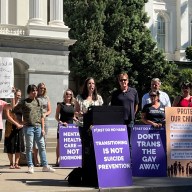Mark Rylance was the man who said no to Steven Spielberg. In 1987, as an up-and-coming actor who’d already conquered the English stage, he turned down a key role in “Empire of the Sun,” preferring a theatrical project. When Rylance finally said yes, for Spielberg’s “Bridge of Spies,” almost 30 years had passed. The result was that one of the finest and most acclaimed actors of his generation, who’s only deigned to do a handful of film roles, scored an Oscar to add to his two Oliviers and three Tonys. Rylance must have really liked working with the legendary director, as they immediately reunited for “The BFG,” in which he plays Roald Dahl’s big, friendly giant who meets young Sophie (Ruby Barnhill). That required the strange task of acting with motion-capture gizmos all over him — a process Rylance found strangely liberating. For an actor, it must be pleasurable to speak the BFG’s bizarre language of misnomers and nonsense: Words like “gobblefunk,” “squibbling,” “whoopsey-splunkers.” RELATED: Interview: Mahershala Ali on how “Free State of Jones” is not a typical Civil War film It’s often said James Joyce’s “Ulysses” is best heard than read. They read it every year on Bloomsday. Let’s talk about the motion-capture technique, which was a first for you. That must be unusual, especially for someone who’s acted for so long. And because of the gizmos on you you’re not acting for a camera lens. How quickly did you find the BFG as a character? As his name promises, he’s friendly. But he can be grumpy and insecure, too. RELATED: Meet Julian Dennison, young star of “Hunt for the Wilderpeople” Dahl’s books are very dark and mordant. These days parents are reluctant to expose their children to dark things. And it has great lessons on top of involving a world in which some giants who eat children. Follow Matt Prigge on Twitter @mattprigge
I think you’re right: The word is “pleasurable.” A lot of words now are scientific words, technical words. They’re not constructed for pleasure. They’re constructed for clarity and usefulness in function. Shakespeare and a lot of them are probably read now more than they’re spoken or heard. And Shakespeare certainly wrote to be heard. One of the lovely things about this book is [Roald Dahl] created it by telling his daughters the story at bedtime. I meet so many fathers and children who’ve read it to their children or had it read to them. It’s an oral book, and these words are very pleasurable to say and pleasurable to hear. They’re not like some kind of financial board report. [Laughs]
That’s certainly what Yeats used to do. Once he’d written a poem he’d read it out loud in order to get the sound right.
It was more like being in a play. It was like being in the last week’s rehearsal of play, when the set is marked out on the floor and you haven’t got all the parts for the furniture. You’re just playing the relationships and the connections between you and the other characters. In that way it was quite liberating. Usually in film you have to hit the X on the floor so [the shot’s] in focus and the lights are right. It’s quite like American football: It’s some scientific strategy in American football, rather than a free-flowing game, like English football or rugby, where the play takes place wildly. Apart from the technical stuff you have to wear, the actual acting reminded me of being in the theater.
The camera’s all around you. The next day after you act, Steven decides where to put the camera. He could put it anywhere. That’s one thing that’s challenging: You don’t know if it’s going to be a close-up or a long shot or a profile or over your shoulder. So you just have to be real. I missed the camera a little bit, to be honest, at first. I missed the attention and concentration of the camera crew and the energy of the camera, the movements of the camera. It’s bit like acting in the round in the theater. You have to create your own sense of focus in such a space.
It’s funny on film: You have to land running. I don’t know, I just make it up. [Laughs]
Certainly the older guys I was interested in as a kid were the ones who were really grumpy and said, “Get out of here!” and then threw things at you. Eventually you discovered they had a soft side in them. It was always those wild guys on the edge of town who were the most interesting and had the funniest tales to tell. I wanted the Giant to be a little frightening at first. At first [Sophie] thinks he’s going to cook her up! But he doesn’t, of course; he’s a vegetarian. He’s a very gentle, imaginative sort, and he likes to walk around listening to the conversations of the ants and the butterflies and the trees and the plants. He’s an animist. He’s a very gentle aspect of nature.
I think children have a great capacity coming into the world. I don’t think they’re a blank canvas. They dream. The world has some gigantic and frightening things that can happen: floods, earthquakes, fires — all sorts of forces greater than us. I suppose there are things you want to protect your kids from. But not this kind of mythology. I’d say they should be more worried about war films, or a film like “American Sniper” —whatever that was called, I didn’t see it. I think these violent things that are presented in very realistic ways are more frightening. This didn’t seem to be a negative thing.
And it shows the great friendships you can have across very different cultures, different sizes. [Laughs] It’s a story, really, about two very lonely people who find each other —really liberate each other, I’d say.

















